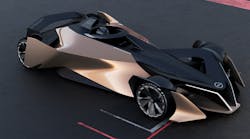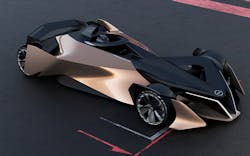High-Performance Single-Seat EV Concept Revealed
What you'll learn:
- The inspiration behind the Nissan Ariya Single Seater Concept car.
- Nissan's carbon-neutral goals it expects to achieve by 2050.
Motor racing has a big influence on the technology found in everyday cars, with advances in aerodynamic efficiency, handling, safety measures, and engine performance transferring to the vehicles we drive. Car manufacturers invest millions every year to showcase their brand to the world in a competitive arena where racing serves as a research laboratory for developing new solutions and showing the world what’s technically possible.
To that end, as part of the company's annual Nissan Futures showcase, the Nissan Ariya Single Seater Concept was displayed as a testbed for future technological evolution. It also serves as an example of how its all-electric road car powertrain could be used in a motorsports package.
Formula E
Nissan cites its participation in the ABB FIA Formula E World Championship as playing a key role in inspiring the Nissan Ariya Single Seater Concept. The concept vehicle explores the combination of the all-electric powertrain, dual motors, and the all-wheel drive system of the Ariya with a pure single-seat racing chassis.
“Nissan competes in Formula E not only to race on track, but also to support the development of compelling electric vehicles for customers,” said Tommaso Volpe, Nissan global motorsports director. “Our EV programs inform our Formula E program and vice versa, allowing for road-to-track technology transfer as well as track-to-road.”
The Ariya Single Seater Concept was presented by Alfonso Albaisa, Nissan senior vice president for global design, and Juan Manuel Hoyos, Nissan global marketing divisional general manager for brand and engagement. Said Hoyos, “With this concept, we want to showcase the high-performance potential of the Ariya’s powertrain in a motorsports-inspired package that not only hints at the design and styling of the road car that inspired it, but that also demonstrates a new and efficient EV performance language.”
Albaisa added, “As we began to shape our Nissan Ambition 2030 long-term vision, we continue to build on our Timeless Japanese Futurism design language. We are now drawing inspiration from the Japanese words shun, meaning to run fast and effortlessly, and sho, meaning to soar with power and grace. The Ariya Single Seater Concept is the perfect expression of this new language.”
Design cues from the all-new Nissan Ariya all-electric SUV can be seen across the Ariya Single Seater Concept. At the front of the vehicle is the electrified and illuminated "V," familiar from Nissan's current road car design. At the side view, inspiration was taken from the Ariya's fluid surfaces, exaggerated to a maximum in carbon fiber.
Carbon Neutrality by 2050
The concept supports Nissan’s goal to be carbon-neutral across the lifecycle of its products by fiscal year 2050, reaching the following goals along the way:
*To accelerate electrification plans with an investment of 2 trillion yen ($17.73 billion) over the next five years.
*To launch 23 new electrified models, including 15 new EVs, aiming for a 50% electrification mix globally across the Nissan and INFINITI brands by fiscal year 2030.
*To introduce Nissan’s all-solid-state batteries (ASSBs) in fiscal year 2028 and ready a pilot plant in Yokohama as early as fiscal year 2024. According to Nissan, by reducing charging time to one-third, ASSBs will make EVs more efficient and accessible. Further, Nissan expects ASSB to bring the cost of battery packs down to $75 per kilowatt-hour by fiscal year 2028, and aims to drop it further to $65 per kilowatt-hour to achieve cost parity between EVs and gasoline vehicles in the future.
To make progress toward this, Nissan will continue to evolve its lithium-ion battery technologies and introduce cobalt-free technology to reduce the cost by 65% by fiscal year 2028. Working with its partners, Nissan intends to increase its global battery production as well as expand its battery refurbishing facilities beyond Japan with new locations in Europe during fiscal year 2022, and in the U.S. in fiscal year 2025.
*Nissan intends to increase its electrification sales mix across major markets by fiscal year 2026, including:
- Europe by more than 75% of sales
- Japan by more than 55% of sales
- China by more than 40% of sales
- The United States by 40% of EV sales in fiscal year 2030
*Just in the next five years alone, the automaker plans to add 20 new electric and electrified models.
Nissan further aims to expand ProPILOT technology to over 2.5 million Nissan and INFINITI vehicles by fiscal year 2026. ProPILOT is an autonomous-drive technology designed for highway use in single-lane traffic. Nissan said it is the first Japanese automaker to introduce a combination of steering, accelerator, and braking that can be operated in full automatic mode, easing driver workload in heavy highway traffic and long commutes.
The company also will develop its autonomous-vehicle technologies, aiming to incorporate next-generation LiDAR systems on virtually every new model by fiscal year 2030.

